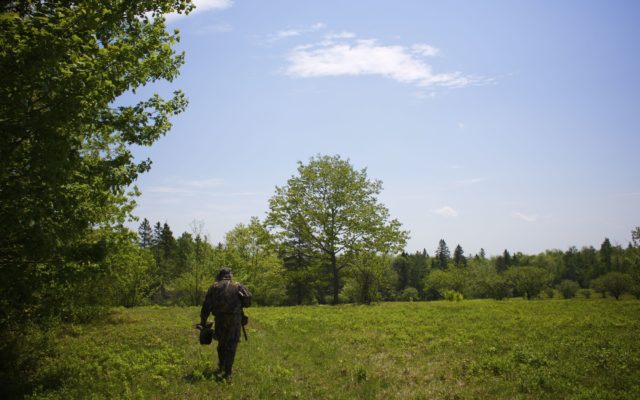
Maine turkey hunters embrace new online self-registration
By Pete Warner, Bangor Daily News Staff
Nearly 70 percent of turkey hunters embraced the state’s new electronic self-registration system during the spring season.
The fledgling program, which gave hunters the option of registering their turkeys electronically, or using the traditional in-person tagging method, is the first of its kind in Maine.
During the spring hunting season 67 percent of hunters tagged their turkeys electronically, outpacing the state’s expectations, said Kelsey Sullivan, game bird biologist for the Maine Department of Inland Fisheries and Wildlife.
The state estimated approximately 50 percent of hunters would register electronically, Sullivan said.
“We thought there would be quite a bit of participation, but I think we were surprised that it was that much more,” he said. “I guess these days it kind of makes sense since everybody’s got a phone.”
The system of providing both tagging options is likely a precursor to a similar arrangement for deer hunting in the future. A bill passed last year directed the wildlife department to make electronic tagging available for turkeys as it studied possible ways to do so for other big-game species.
Hunters registered 7,050 wild turkeys during the spring season from May 1 through June 3.
“It was our second highest [harvest], and last year was right around the same,” Sullivan said, pointing to the record 2022 kill of 7,081 birds.
“I don’t think we’ve ever seen two years back to back like that,” Sullivan said of the large harvests.
During the fall turkey season, hunters are not required to register their birds.
With only 33 percent of hunters registering turkeys at tagging stations, some stations saw a reduction in traffic
Howell’s Indoor Range and Gun Shop in Gray tagged approximately 50 turkeys this spring, about half of what they normally do, owner Adam Cobb said.
“It was very slow and, yes, it had an impact on our business,” said Dawn Vavsary of D&L Country Store in Oakland, who declined to provide further details.
But turkey tagging isn’t big business for most merchants, who receive only a $2 fee to register a bird, so the reduction won’t necessarily harm the businesses. However, if hunters aren’t going to the stores, there is potential lost revenue from food, beverage and other sales.
At establishments like Howell’s, which sells firearms and provides shooting education and other services, the relationship still brings hunters back.
Many of those who visited the store were youngsters with their parents and nonresident hunters.
“We make a big deal of the youth hunters, and it’s great to see them come in with their trophies,” Cobb said. “Tagging doesn’t have much of an impact on day-to-day business, but it does give us some closure when we see a successful hunter that we’ve worked with be successful.”
Cobb said some longtime hunters keep the physical tag from registering turkeys for their collection of those mementos.
“It’s great to see them come back with the fruits of their labor and have a successful hunt,” Cobb said. “We do enjoy being a destination for hunters and swappings stories of a successful day afield.”
While two-thirds of turkey hunters embraced self-registration, which is free, there were mixed reviews from game tagging stations.
Byron Dill of Dill’s Outdoors in Bangor said some of his customers decided to tag their birds in person after struggling with the online system.
Sullivan said some hunters experienced difficulties with internet connectivity, while others duplicated their MOSES ID, which would require them to register in person. MOSES is the wildlife department’s online hunting, fishing and trapping licensing system.
“The system itself was pretty seamless,” Sullivan said.
Relying solely on hunters to record their kills may open the door for the possibility of birds not being registered, mistakenly or intentionally.
“I think the majority of Mainers are very responsible and want to provide the information, so I expect it’s very few folks that that happens with,” Sullivan said.